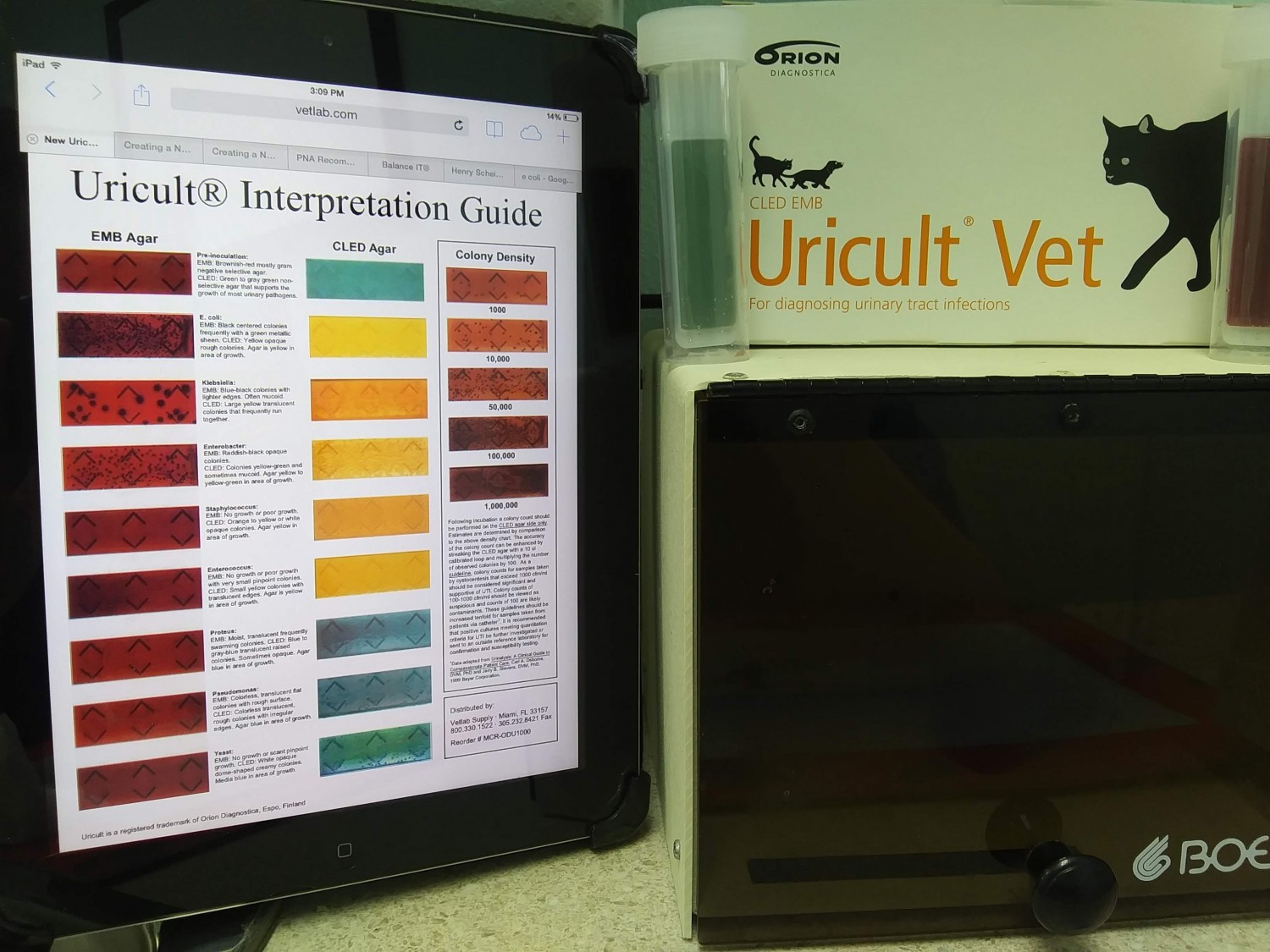Diagnostic Services
Below are descriptions of some of the diagnostic tests that may be recommended for your pet by your veterinarian during your visit to Woodland Animal Hospital.
Radiology:
Woodland has the newest technology in Digital X-ray equipment that allows us to get the most precise and clear picture of what is going on inside of the body.
Radiographs (x-rays) allow us to visualize internal structures such as bone and organs like the kidneys, stomach, or heart. Radiation is used to record images on a plate, which transfers the information to a computer program that interprets it. The parts of the body will appear lighter or darker depending on the rate the tissues absorb x-rays. Bone absorbs the most x-rays, and will appear lightest on radiographs. Air, such as in the lungs, absorbs the least x-rays, and therefore will appear darkest on radiographs. Soft tissues, such as organs and fat, fall in between and appear in shades of grey.
Ultrasound:
Ultrasound uses high-frequency sound waves to visualize internal structures in the body. Because ultrasound images are captured in real-time, they can show movement of the organs and blood flow within the vessels. In veterinary medicine, ultrasound in commonly used to detect changes in the appearance of organs or tissues, detect and monitor pregnancy, detect abnormal masses (tumors), and as guidance for fine needle aspirates or biopsies.
Ultrasound is often recommended in conjunction with radiography. We offer in-house ultrasound services including thoracic and abdominal ultrasound, pregnancy ultrasound, and ultrasound-guided fine needle aspirates or biopsies.
|

|
In-house laboratory services:
|
Hematology: A complete blood count (CBC) will check the red blood cell, white blood cell, and platelet counts. White blood cells help fight infection and may be elevated in the presence of inflammation. Red blood cells carry oxygen to the tissues; a decrease in red blood cells numbers (anemia) may occur for a variety of reasons, including chronic illness or kidney disease. Platelets are involved in clotting the blood and may decrease (thrombocytopenia) with some illnesses, including tick borne diseases and bleeding disorders.

|

Serum chemistry: A serum chemistry profile includes tests that check organ systems and their function. These tests include blood glucose, electrolytes, calcium, kidney enzymes, liver enzymes, pancreatic enzymes, and proteins.
Thyroid testing: Thyroid hormone levels may increase or decrease with endocrine disease or illness. Overproduction of thyroid hormone (hyperthyroidism) is common in older cats, while underproduction of thyroid hormone (hypothyroidism) is common in older dogs.
|
|
Urinalysis: A urinalysis consists of a urine specific gravity, urine dip stick, and sediment. The urine specific gravity (USG), or concentration of the urine, may decrease with endocrine disorders (ex: diabetes, Cushing's disease) or kidney disease. The urine dip stick checks urine components, including pH and the presence of substances like blood, protein or glucose. The sediment involves spinning the urine in a centrifuge, then using a microscope to check the concentrated portion for the numbers and type of cells present.
Urine Culture: We offer in house urine cultures with the use of Uricult culture system. Uricult gives us the ability to identify what bacteria is present in the urine so that we are better able to make an antibiotic choice. This also allows us to confirm bacterial infection versus sterile cystitis, which is often a problem in feline patients.
|

|
Cytology: Cytology provides a quick and relatively non-invasive method way to examine cells in body fluids and skin masses. Infection, inflammation, or cancer (neoplasia) can often be identified through microscopic evaluation of the fluid or cells. The sample is usually obtain via fine needle aspirate: a small needle is inserted to collect cells or fluid which is then stained and assessed under a microscope.
|

|
|
Heartworm testing: Both dogs and cats are susceptible to heartworm disease, though they are more commonly diagnosed in dogs. Heartworms are spread via mosquitoes. In Missouri, pets are at risk of contracting this parasite year round. Heartworm disease can be deadly if left untreated! We recommend heartworm preventative for both dogs and cats, as well as yearly heartworm testing for dogs.
|
Feline immunodeficiency Virus/Feline Leukemia testing: Feline Immunodeficiency Virus (FIV) and Feline Leukemia (FeLV) are retroviruses that can be transmitted between cats of any age. Infections with these viruses are most common in outdoor cats or kittens born to infected mothers. Transmission of FIV is primarily through bite wounds. Transmission of FeLV is primarily through bite wounds or mutual grooming. Both viruses can lead to immune deficiency, which can lead to severe illness in infected animals from other infectious agents that would not affect healthy animals. FeLV can also cause cancer in affected cats. We recommend that any new cat or kitten entering a household be tested for FIV and FeLV prior to introduction to other household pets.
|
|
Fecal Flotation: Yearly screening is recommended for our younger and middle-aged patients to look for intestinal parasites. Common parasites include roundworms (especially in puppies and kittens), hookworms, whipworms and coccidia. We also offer testing for intestinal parasites not routinely seen on fecal flotation, such as Giardia.

|

Ophthalmology: We offer several diagnostics for the eye, including staining to diagnose corneal ulcers, tonometry for ocular pressures, and Schirmer Tear Testing to assess the eye's ability to produce an adequate number of tears
|
Outsourced laboratory services:
Some laboratory tests require special equipment in order to be performed. Diagnostic services such as histopathology, virus serology, and bacterial culture are sent to outsourced laboratories such as Antech, the University of Missouri Veterinary Medical Diagnostic Lab and many more. Results for these type of tests are usually received anywhere from 2 days to 2 weeks.
|













